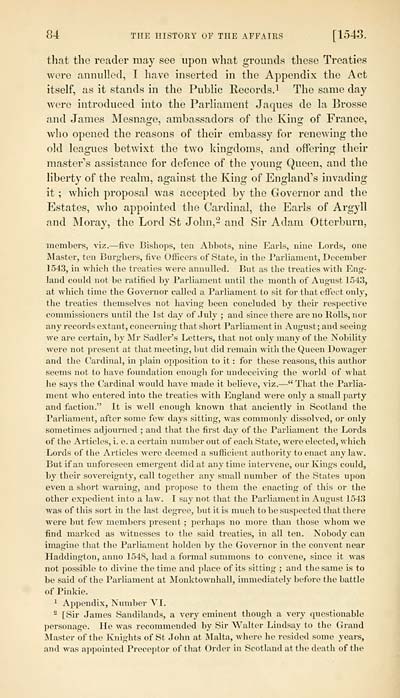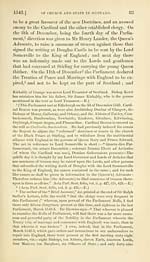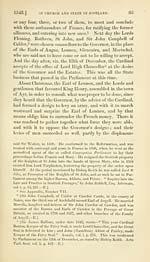Spottiswoode Society > History of the affairs of the Church and State of Scotland from the beginning of the reformation to the year 1568 > Volume 1
(220) Page 84
Download files
Complete book:
Individual page:
Thumbnail gallery: Grid view | List view

84 THE HISTORY OF THE AFFAIRS [1543.
that the reader may see upon what grounds these Treaties
were annulled, I have inserted in the Appendix the Act
itself, as it stands in the Public Eecords. 1 The same day
were introduced into the Parliament Jaques de la Brosse
and James Mesnage, ambassadors of the King of France,
who opened the reasons of their embassy for renewing the
old leagues betwixt the two kingdoms, and offering their
master's assistance for defence of the young Queen, and the
liberty of the realm, against the King of England's invading
it ; which proposal was accepted by the Governor and the
Estates, who appointed the Cardinal, the Earls of Argyll
and Moray, the Lord St John, 2 and Sir Adam Otterburn,
members, viz. — five Bishops, ten Abbots, nine Earls, nine Lords, one
Master, ten Burghers, five Officers of State, in the Parliament, December
1543, in which the treaties were annulled. But as the treaties with Eng-
land could not be ratified by Parliament until the month of August 1543,
at which time the Governor called a Parliament to sit for that effect only,
the treaties themselves not having been concluded by their respective
commissioners until the 1st day of July ; and since there are no Rolls, nor
any records extant, concerning that short Parliament in August; and seeing
we are certain, by Mr Sadler's Letters, that not only many of the Nobility
were not present at that meeting, but did remain with the Queen Dowager
and the Cardinal, in plain opposition to it : for these reasons, this author
seems not to have foundation enough for undeceiving the world of what
he says the Cardinal would have made it believe, viz. — "That the Parlia-
ment who entered into the treaties with England were only a small party
and faction." It is well enough known that anciently in Scotland the
Parliament, after some few days sitting, was commonly dissolved, or only
sometimes adjourned ; and that the first day of the Parliament the Lords
of the Articles, i. e. a certain number out of each State, were elected, which
Lords of the Articles were deemed a sufficient authority to enact any law.
But if an unforeseen emergent did at any time intervene, our Kings could,
by their sovereignty, call together any small number of the States upon
even a short warning, and propose to them the enacting of this or the
other expedient into a law. I say not that the Parliament in August 1543
was of this sort in the last degree, but it is much to be suspected that there
were but few members present ; perhaps no more than those whom we
find marked as witnesses to the said treaties, in all ten. Nobody can
imagine that the Parliament holden by the Governor in the convent near
Haddington, anno 1548, had a formal summons to convene, since it was
not possible to divine the time and place of its sitting ; and the same is to
be said of the Parliament at Monktownhall, immediately before the battle
of Pinkie.
1 Appendix, Number VI.
2 [Sir James Sandilands, a very eminent though a very questionable
personage. He was recommended by Sir Walter Lindsay to the Grand
Master of the Knights of St John at Malta, where he resided some years,
and was appointed Preceptor of that Order in Scotland at the death of the
that the reader may see upon what grounds these Treaties
were annulled, I have inserted in the Appendix the Act
itself, as it stands in the Public Eecords. 1 The same day
were introduced into the Parliament Jaques de la Brosse
and James Mesnage, ambassadors of the King of France,
who opened the reasons of their embassy for renewing the
old leagues betwixt the two kingdoms, and offering their
master's assistance for defence of the young Queen, and the
liberty of the realm, against the King of England's invading
it ; which proposal was accepted by the Governor and the
Estates, who appointed the Cardinal, the Earls of Argyll
and Moray, the Lord St John, 2 and Sir Adam Otterburn,
members, viz. — five Bishops, ten Abbots, nine Earls, nine Lords, one
Master, ten Burghers, five Officers of State, in the Parliament, December
1543, in which the treaties were annulled. But as the treaties with Eng-
land could not be ratified by Parliament until the month of August 1543,
at which time the Governor called a Parliament to sit for that effect only,
the treaties themselves not having been concluded by their respective
commissioners until the 1st day of July ; and since there are no Rolls, nor
any records extant, concerning that short Parliament in August; and seeing
we are certain, by Mr Sadler's Letters, that not only many of the Nobility
were not present at that meeting, but did remain with the Queen Dowager
and the Cardinal, in plain opposition to it : for these reasons, this author
seems not to have foundation enough for undeceiving the world of what
he says the Cardinal would have made it believe, viz. — "That the Parlia-
ment who entered into the treaties with England were only a small party
and faction." It is well enough known that anciently in Scotland the
Parliament, after some few days sitting, was commonly dissolved, or only
sometimes adjourned ; and that the first day of the Parliament the Lords
of the Articles, i. e. a certain number out of each State, were elected, which
Lords of the Articles were deemed a sufficient authority to enact any law.
But if an unforeseen emergent did at any time intervene, our Kings could,
by their sovereignty, call together any small number of the States upon
even a short warning, and propose to them the enacting of this or the
other expedient into a law. I say not that the Parliament in August 1543
was of this sort in the last degree, but it is much to be suspected that there
were but few members present ; perhaps no more than those whom we
find marked as witnesses to the said treaties, in all ten. Nobody can
imagine that the Parliament holden by the Governor in the convent near
Haddington, anno 1548, had a formal summons to convene, since it was
not possible to divine the time and place of its sitting ; and the same is to
be said of the Parliament at Monktownhall, immediately before the battle
of Pinkie.
1 Appendix, Number VI.
2 [Sir James Sandilands, a very eminent though a very questionable
personage. He was recommended by Sir Walter Lindsay to the Grand
Master of the Knights of St John at Malta, where he resided some years,
and was appointed Preceptor of that Order in Scotland at the death of the
Set display mode to: Large image | Transcription
Images and transcriptions on this page, including medium image downloads, may be used under the Creative Commons Attribution 4.0 International Licence unless otherwise stated. ![]()
| Permanent URL | https://digital.nls.uk/79599428 |
|---|
| Description | Volume I. |
|---|---|
| Attribution and copyright: |
|

